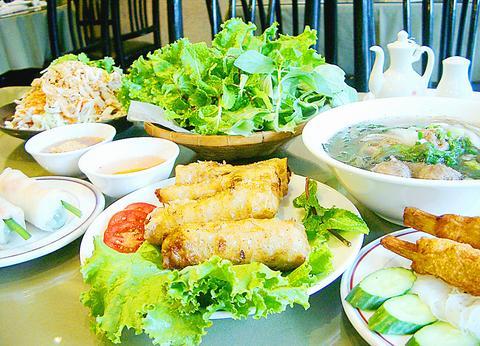Madame Jill's was the first Vietnamese restaurant to come to Taipei, when the Vietnam War was still raging. In 1974, the Lin family (overseas Chinese) moved to Taipei because of the war and set up the first branch of Madame Jill's, across the street from National Taiwan University. Over the past 30 years three other branches have been established and they remain frequently visited spots around the neighborhood.
With southeast Asian food becoming more popular in recent years and with more Vietnamese wives opening their own restaurants in the country, Madame Jill's nevertheless thrives, surviving the economic slump two years ago and the SARS outbreak last year.

PHOTO: YU SEN-LUN, TAIPEI TIMES
Asked if there were any secrets to maintaining the business, Liang Hai-ying (
"You want to make sure that each bowl of pho (rice noodles) tastes the same all the time," she said.
Chicken salad Vietnamese style is a refreshing starter, which is a mixture of shreds of cabbage, cucumber, chicken and carrots and sprinkled with peanut powder. It is then seasoned with fish sauce, a necessity in any Vietnamese dish.
"The fish sauce is the equivalent of soy sauce in Chinese cuisine. You season almost every dish with it," Liang said.
Spring Rolls are another must-try at Madame Jill's. There are two kinds of spring roll skins: Vietnamese style (made of rice) and Taiwanese style (made of flour). For sure, the Vietnamese style tastes better here, despite some local customers' preference for the other. The traditional method of preparation is to wrap the spring roll with a lettuce leaf, adding basil and mint leaves, which is then dipped in a home-made fish sauce. It tastes sweet and sour, and slightly spicy.
Though a bowl of rice noodles with beef in a soup is a often ordered as a main course, it is recommended that you order extra beef meatballs. For a more "colonial taste," one should try spicy coconut beef with French baguette. The bread is home made, Liang said.
Deserts here are a mixture of Thai, Malaysian and Vietnamese. The home-made laya cake is worth-trying, though. It is a green-colored, coconut flavored cake, made with the juice of laya tree leaves, a tropical tree common in Vietnam.

Growing up in a rural, religious community in western Canada, Kyle McCarthy loved hockey, but once he came out at 19, he quit, convinced being openly gay and an active player was untenable. So the 32-year-old says he is “very surprised” by the runaway success of Heated Rivalry, a Canadian-made series about the romance between two closeted gay players in a sport that has historically made gay men feel unwelcome. Ben Baby, the 43-year-old commissioner of the Toronto Gay Hockey Association (TGHA), calls the success of the show — which has catapulted its young lead actors to stardom -- “shocking,” and says

Inside an ordinary-looking townhouse on a narrow road in central Kaohsiung, Tsai A-li (蔡阿李) raised her three children alone for 15 years. As far as the children knew, their father was away working in the US. They were kept in the dark for as long as possible by their mother, for the truth was perhaps too sad and unjust for their young minds to bear. The family home of White Terror victim Ko Chi-hua (柯旗化) is now open to the public. Admission is free and it is just a short walk from the Kaohsiung train station. Walk two blocks south along Jhongshan

The 2018 nine-in-one local elections were a wild ride that no one saw coming. Entering that year, the Chinese Nationalist Party (KMT) was demoralized and in disarray — and fearing an existential crisis. By the end of the year, the party was riding high and swept most of the country in a landslide, including toppling the Democratic Progressive Party (DPP) in their Kaohsiung stronghold. Could something like that happen again on the DPP side in this year’s nine-in-one elections? The short answer is not exactly; the conditions were very specific. However, it does illustrate how swiftly every assumption early in an

Snoop Dogg arrived at Intuit Dome hours before tipoff, long before most fans filled the arena and even before some players. Dressed in a gray suit and black turtleneck, a diamond-encrusted Peacock pendant resting on his chest and purple Chuck Taylor sneakers with gold laces nodding to his lifelong Los Angeles Lakers allegiance, Snoop didn’t rush. He didn’t posture. He waited for his moment to shine as an NBA analyst alongside Reggie Miller and Terry Gannon for Peacock’s recent Golden State Warriors at Los Angeles Clippers broadcast during the second half. With an AP reporter trailing him through the arena for an